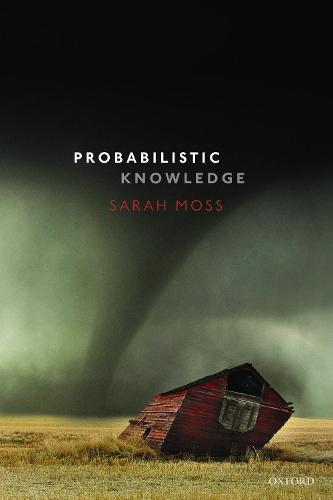Awards
- Winner of Winner of the APA 2020 Sanders Book Prize.
Overview
Traditional philosophical discussions of knowledge have focused on the epistemic status of full beliefs. Sarah Moss argues that in addition to full beliefs, credences can constitute knowledge. For instance, your 0.4 credence that it is raining outside can constitute knowledge, in just the same way that your full beliefs can. In addition, you can know that it might be raining, and that if it is raining then it is probably cloudy, where this knowledge is not knowledge of propositions, but of probabilistic contents. The notion of probabilistic content introduced in this book plays a central role not only in epistemology, but in the philosophy of mind and language as well. Just as tradition holds that you believe and assert propositions, you can believe and assert probabilistic contents. Accepting that we can believe, assert, and know probabilistic contents has significant consequences for many philosophical debates, including debates about the relationship between full belief and credence, the semantics of epistemic modals and conditionals, the contents of perceptual experience, peer disagreement, pragmatic encroachment, perceptual dogmatism, and transformative experience. In addition, accepting probabilistic knowledge can help us discredit negative evaluations of female speech, explain why merely statistical evidence is insufficient for legal proof, and identify epistemic norms violated by acts of racial profiling. Hence the central theses of this book not only help us better understand the nature of our own mental states, but also help us better understand the nature of our responsibilities to each other.
Full Product Details
Author: Sarah Moss (Associate Professor of Philosophy, Associate Professor of Philosophy, University of Michigan, Ann Arbor)
Publisher: Oxford University Press
Imprint: Oxford University Press
Dimensions:
Width: 15.40cm
, Height: 0.20cm
, Length: 23.10cm
Weight: 0.432kg
ISBN: 9780198858096
ISBN 10: 0198858094
Pages: 280
Publication Date: 27 February 2020
Audience:
Professional and scholarly
,
Professional & Vocational
Format: Paperback
Publisher's Status: Active
Availability: To order

Stock availability from the supplier is unknown. We will order it for you and ship this item to you once it is received by us.
Reviews
Essential reading for philosophers of language, semanticists, and formal epistemologists. . . . Probabilistic Knowledge offers a persuasive case for a radical revision of some foundational ideas about the nature of content and communication. . . . rich and rewarding. * Daniel Greco, Journal of Philosophy * The title concept of this book, probabilistic knowledge, involves a radical revision of some central ideas of epistemology. But it ends up providing a more unified account of many phenomena of recent interest. Philosophers with an interest in the formal semantics of conditionals or epistemic modals, and epistemologists working on contextualism or the interaction of credence and belief, should probably read most or all of this book. And many other philosophers should also find a copy. * Kenny Easwaran, Notre Dame Philosophical Reviews *
The title concept of this book, probabilistic knowledge, involves a radical revision of some central ideas of epistemology. But it ends up providing a more unified account of many phenomena of recent interest. Philosophers with an interest in the formal semantics of conditionals or epistemic modals, and epistemologists working on contextualism or the interaction of credence and belief, should probably read most or all of this book. And many other philosophers should also find a copy. * Kenny Easwaran, Notre Dame Philosophical Reviews * Essential reading for philosophers of language, semanticists, and formal epistemologists. . . . Probabilistic Knowledge offers a persuasive case for a radical revision of some foundational ideas about the nature of content and communication. . . . rich and rewarding. * Daniel Greco, Journal of Philosophy *
Author Information
Sarah Moss is Associate Professor of Philosophy at the University of Michigan, Ann Arbor. She received her A.B. in Mathematics from Harvard University and her B.Phil. in Philosophy from Oxford University, where she studied as a Marshall Scholar. She received her Ph.D. in Philosophy with a minor in Linguistics from MIT in 2009.




